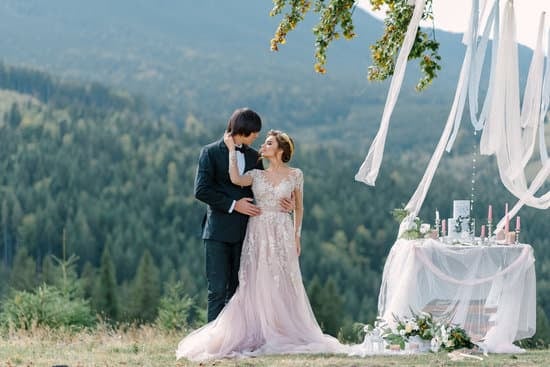Handling wedding RSVPs is a crucial aspect of planning a successful and stress-free event. It ensures that all guests are accounted for, allowing the couple to make necessary preparations for their big day. In this article, we will delve into the intricacies of addressing wedding RSVPs, offering valuable insights on how to effectively manage these responses from guests.
RSVPs play a vital role in the wedding planning process, as they provide couples with valuable information about who will be attending their special day. Knowing the number of guests helps in arranging seating, catering, and other logistics to ensure everything runs smoothly. Properly handling RSVPs also shows respect towards your guests by making sure they feel valued and accommodated at your event.
In the following sections, we will explore the purpose of RSVPs and why they are essential for organizing a successful wedding. We will also discuss proper etiquette when requesting responses from guests, addressing envelopes correctly for easy tracking, managing deadlines for replies, tracking guest responses efficiently, following up with guests who have not responded, dealing with late RSVPs, and finalizing the guest list based on responses received.
Stay tuned for valuable tips on navigating through the process of handling wedding RSVPs seamlessly.
Understanding the Purpose of RSVPs
When planning a wedding, one of the crucial aspects to consider is handling the RSVPs efficiently. Understanding the purpose of RSVPs is essential for ensuring a successful and stress-free event. RSVP stands for “Répondez s’il vous plaît” in French, which translates to “Please respond” in English. This request for response serves as a way for couples to get an accurate count of how many guests will be attending their wedding.
RSVPs are vital for various reasons when it comes to planning a wedding. Firstly, they help couples estimate the number of guests who will be present on their special day, allowing them to make necessary arrangements such as seating, catering, and accommodations. Knowing the final headcount can also help in determining costs and avoiding unnecessary expenses. Additionally, having an accurate guest count enables couples to create a timeline for the event, ensuring that everything runs smoothly on the big day.
To address wedding RSVPs effectively, couples should clearly communicate their expectations to guests regarding responses. It is important to politely request RSVPs by providing clear instructions on how and by when guests should reply.
Couples can include response cards with pre-stamped envelopes, create online RSVP forms, or use wedding websites for easier tracking. By setting a deadline for responses and following up with gentle reminders as needed, couples can streamline the RSVP process and better plan for their wedding day.
| Benefits of Addressing Wedding RSVP | Importance |
|---|---|
| Accurate guest count | Helps in making necessary arrangements and avoiding extra costs |
| Smooth event timeline | Allows for proper scheduling of activities during the wedding |
Proper Etiquette for RSVPs
When it comes to planning a wedding, one of the most crucial aspects is ensuring that you receive timely RSVPs from your guests. Proper etiquette in requesting these responses is key to making the process smooth and stress-free. Here are some tips on how to politely request RSVPs from your invitees.
Personalized Invitations
One way to encourage guests to respond promptly is by sending out personalized invitations. Including their names on the invitation not only adds a thoughtful touch but also shows that you value their presence at your special day. This personalization can make them feel more inclined to RSVP promptly in order not to miss out on your celebration.
Clear Instructions
Make sure to include clear instructions on how guests can RSVP, whether it be through a designated website, email, or phone number. Providing multiple options for responding can make it easier for guests to choose their preferred method and increase the likelihood of prompt replies. Clearly communicate the deadline for responses so that guests understand the importance of submitting their RSVP in a timely manner.
Polite Language
When requesting RSVPs from your guests, remember to use polite and courteous language. Express your excitement at having them attend and kindly ask for their response by the specified date. Avoid sounding demanding or pushy, as this may discourage guests from replying promptly. A friendly tone in your request can go a long way in encouraging timely responses from your invitees.
By following these etiquette tips on how to request wedding RSVPs from your guests, you can streamline the planning process and ensure that you have an accurate guest count for your big day. Remember that effective communication and politeness are key when handling RSVPs, ultimately leading to a smoother and more enjoyable wedding planning experience.
Addressing Envelopes
Include Clear Instructions
When addressing the RSVP envelopes, be sure to clearly indicate where guests should write their response. Whether it’s a designated space for “RSVP” or a separate card enclosed, providing clear instructions will help prevent any confusion and ensure that responses are easily identified.
Print or Write Neatly
To avoid any miscommunication or errors in reading the addresses, make sure to print or write the addresses neatly on the RSVP envelopes. A legible handwriting style will eliminate any potential issues with delivery and tracking of responses.
Add Return Address
Including a return address on the RSVP envelope is essential for tracking purposes. In case the envelope gets lost or misplaced, having a return address will ensure that it can be returned to you promptly. Additionally, having a return address makes it convenient for guests to send back their responses without any hassle.
By following these simple guidelines on how to address RSVP envelopes, you can streamline the process of tracking guest responses and ensure that you have an accurate headcount for your wedding day. Paying attention to these details will not only help you stay organized but also show consideration towards your guests in making it easier for them to respond promptly.
Deadline Management
Setting and enforcing RSVP deadlines is crucial in ensuring that you receive timely responses from your invited guests. Here are some tips on how to effectively manage the RSVP deadline for your wedding:
- Set a Clear Deadline: Clearly communicate the RSVP deadline on your invitations so that guests are aware of when they need to respond by. This will help avoid misunderstandings and ensure that you receive responses in a timely manner.
- Give Ample Time: Be considerate of your guests’ schedules and give them enough time to respond to your invitation. Typically, setting the RSVP deadline 3-4 weeks before the wedding date is recommended to allow for enough time for planning.
- Follow Up: As the RSVP deadline approaches, consider sending out gentle reminders to those who have not yet responded. This can help prompt guests to send in their responses before it’s too late.
Dealing With Late Responses
If you receive RSVPs after the deadline has passed, it’s important to handle them gracefully and make decisions accordingly. Here are some ways on how to address late responses:
- Reach Out: Politely contact guests who have sent in their RSVPs after the deadline and inquire if they still plan on attending the wedding. This can help you get a clear picture of your final guest count.
- Consider Logistics: Assess if it’s still feasible to accommodate late responders based on venue capacity, catering arrangements, and seating arrangements. If necessary, be prepared to politely explain that you may not be able to accommodate additional guests due to late responses.
- Maintain Flexibility: While it’s essential to stick to your RSVP deadline, exercise flexibility where possible if there are special circumstances involved. Use discretion when handling late responses and try to accommodate them if it won’t disrupt your overall wedding plans.
By managing your deadline effectively and handling late responses with tact, you can ensure that your wedding planning process goes smoothly and that you have an accurate guest list for your big day.
Tracking RSVPs
Organizing and tracking wedding RSVPs is a crucial part of the planning process to ensure everything runs smoothly on the big day. Keeping track of guest responses can help you finalize important details such as seating arrangements, catering numbers, and overall event logistics. Here are some effective organizational methods to help you manage and track RSVPs efficiently:
- Create a Spreadsheet: One of the most popular methods for tracking RSVPs is by creating a detailed spreadsheet. Include columns for guest names, total number attending, meal preferences, and any other relevant information. This allows you to easily update and reference the list as responses come in.
- Use Online Tools: Utilize online tools or wedding websites that offer RSVP management services. These platforms make it easy for guests to respond electronically, and also provide you with a centralized location to view all responses in real-time.
- Color-Coded System: Implementing a color-coded system can help visually organize your guest list. Assign different colors to indicate who has RSVP’d, who has yet to respond, and any special requirements or notes for specific guests.
Keeping track of RSVPs in an organized manner not only helps streamline the planning process but also allows you to stay on top of any changes or adjustments that may need to be made as responses come in. By using these organizational methods, you can ensure that your wedding day runs smoothly and stress-free. Remember to regularly update your list as RSVPs come in and communicate any final numbers to vendors before the big day.
Following Up
After sending out wedding invitations, it is common for some guests to forget to RSVP by the requested deadline. As a bride and groom, it can be stressful not knowing the final headcount for your big day. This is why it is important to follow up with guests who have not yet responded to your wedding RSVP.
One way to address this issue is by sending gentle reminders to those who have not RSVP’d. You can do this through a polite email or phone call kindly asking them to confirm their attendance or absence. It’s essential to approach this follow-up in a friendly and understanding manner, as guests may have genuinely forgotten amidst their busy schedules.
When crafting these reminders, be sure to express your excitement at having them celebrate your special day with you. Additionally, provide them with clear instructions on how they can submit their response, whether it be through an online RSVP portal, email, or by mailing back the physical RSVP card. By making it easy for guests to respond and conveying your gratitude for their presence, you are more likely to receive timely replies.
Dealing With Late Responses
One way to address late responses is to reach out to guests as soon as their RSVP arrives past the deadline. A polite yet firm reminder can be sent via email, phone call, or even a personalized message.
It’s crucial to communicate that their response is needed for finalizing arrangements and that a timely reply would be greatly appreciated. By following up promptly, you can increase the chances of receiving a response before any other important decisions need to be made.
In some cases, despite reminders and follow-ups, there may still be guests who fail to respond even after the deadline extension. In such situations, it may be necessary to make an executive decision based on what is best for your event.
This could involve reaching out directly to those guests for confirmation or making an informed judgment on whether they will attend based on previous conversations or circumstances. Ultimately, handling late RSVPs with grace and flexibility is key to maintaining smooth planning processes leading up to your special day.
| Dealing With Late Responses | How to Handle RSVPs That Come in After the Deadline |
|---|---|
| Follow up promptly | Reach out via email, phone call, or message |
| Make executive decisions | Decide best course of action based on circumstances |
Finalizing Guest List
Finalizing the guest list for a wedding is a crucial step in the planning process, and it all starts with properly addressing wedding RSVPs. Once all responses have been collected, it’s important to carefully review and make necessary adjustments to ensure that the guest list accurately reflects who will be attending the event. This not only helps with finalizing seating arrangements and catering numbers but also ensures that every guest feels welcomed and accounted for on your special day.
One essential tip for finalizing the guest list based on RSVP responses is to keep a detailed spreadsheet or tracking system. By categorizing guests as ‘Attending,’ ‘Not Attending,’ or ‘No Response,’ you can easily see who has confirmed their attendance and who has regretfully declined.
This allows you to quickly identify any missing RSVPs and follow up with those guests accordingly. Additionally, having a clear overview of the guest list helps in making informed decisions about seating arrangements, meal counts, and other logistical details.
In cases where there are unexpected changes or last-minute responses after the RSVP deadline, it’s vital to remain flexible but also firm in your decisions. Be prepared to make quick adjustments to accommodate new attendees or unexpected cancellations while staying within your venue’s capacity limits and budget constraints.
Communicate openly with vendors and caterers about any changes to ensure a smooth transition on the day of the wedding. Ultimately, being proactive and organized in finalizing the guest list based on RSVP responses plays a significant role in creating a memorable and enjoyable experience for both you and your guests on your special day.
Conclusion
In conclusion, addressing wedding RSVPs is a crucial aspect of planning a successful wedding. Properly handling RSVPs not only ensures an accurate headcount for the event but also reflects good etiquette and organization on the part of the hosts. By following the tips and guidelines outlined in this article, couples can effectively manage their guest list and streamline the process of RSVP collection.
Understanding the purpose of RSVPs goes beyond simply counting guests; it allows for proper seating arrangements, catering orders, and overall event logistics to be smoothly executed. Setting clear deadlines and politely requesting responses from guests is key to receiving timely RSVPs. Addressing envelopes correctly for RSVP cards helps with tracking responses, while utilizing organizational methods can assist in keeping track of who has responded and who hasn’t.
In instances where guests fail to respond by the deadline or submit late RSVPs, hosts should handle these situations gracefully and make necessary adjustments to the guest list accordingly. By finalizing the guest list based on RSVP responses, couples can ensure that all aspects of their wedding day are planned down to the last detail. Overall, addressing wedding RSVPs in a thoughtful and organized manner contributes to a stress-free planning process and a memorable celebration on the big day.
Frequently Asked Questions
What Is the Correct Way to RSVP for a Wedding?
The correct way to RSVP for a wedding is to respond promptly after receiving the invitation. This shows respect for the couple’s planning and helps them finalize guest numbers. Whether it’s through email or traditional mail, make sure to clearly indicate your attendance status.
What Do You Say on a Wedding RSVP Response?
When responding to a wedding RSVP, it is important to be clear and concise. Begin by expressing your gratitude for the invitation, followed by indicating whether you will attend or not.
If you have any dietary restrictions or special requests, this is the time to mention them. End with a warm closing message and your contact information in case the couple needs to reach out.
How Do You Write Your Name on a Wedding RSVP?
When writing your name on a wedding RSVP, make sure it is legible and matches exactly how it appears on the invitation. If you are bringing a guest, include their name as well on the response card if there is space provided for it. Avoid using nicknames or informal terms unless explicitly mentioned by the couple on the invite.

I have been involved in marriages for over 20 years helping couples and singles understand more about them.





![How to Ask for Wedding RSVP How to ask for wedding RSVP: Kindly respond by [date] for our special day](https://www.marriagespirit.com/wp-content/uploads/2023/11/wedding-503-150x150.jpg)